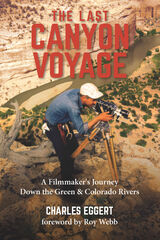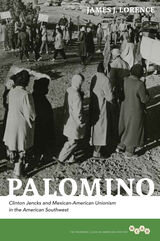2 books about 1918-2005

The Last Canyon Voyage
A Filmmaker's Journey Down the Green and Colorado Rivers
Charles Eggert Foreword by Roy Webb
University of Utah Press, 2020
In 1955 photographer Charles Eggert and renowned river guide Don Hatch set off down the Green River with six others to duplicate the 1870s journey of John Wesley Powell. With dams soon to be built at Flaming Gorge and Glen Canyon, they planned to film the voyage and be the last to travel these waters before the landscape changed forever. Eggert’s film A Canyon Voyage debuted successfully after the trip, but his written narrative of the river, its landscape, its people, and the adventures of the crew was never published.
This book finally brings Eggert’s writings out of the archives and into the public eye. With his keen photographer’s vision and colloquial voice, Eggert describes canyons and towns now deep under water as he tells the story of friendships forged upon the rapids and currents of the rivers. Roy Webb’s foreword provides historical context; river historian Alfred E. Holland Jr. introduces Eggert, the man who transformed into an environmentalist after visiting the West; and Sarah Holcombe’s afterword looks at what transpired in the lives of all eight crew members after the journey. Color and black-and-white illustrations further enliven the text. An engaging read, this is an important piece of river history that also shines light on Eggert’s tremendous influence as a conservation cinematographer.
This book finally brings Eggert’s writings out of the archives and into the public eye. With his keen photographer’s vision and colloquial voice, Eggert describes canyons and towns now deep under water as he tells the story of friendships forged upon the rapids and currents of the rivers. Roy Webb’s foreword provides historical context; river historian Alfred E. Holland Jr. introduces Eggert, the man who transformed into an environmentalist after visiting the West; and Sarah Holcombe’s afterword looks at what transpired in the lives of all eight crew members after the journey. Color and black-and-white illustrations further enliven the text. An engaging read, this is an important piece of river history that also shines light on Eggert’s tremendous influence as a conservation cinematographer.
[more]

Palomino
Clinton Jencks and Mexican-American Unionism in the American Southwest
James J. Lorence
University of Illinois Press, 2013
The first comprehensive biography of progressive labor organizer, peace worker, and economist Clinton Jencks (1918–2005), this book explores the life of one of the most important political and social activists to appear in the Southwestern United States in the twentieth century. A key figure in the radical International Union of Mine, Mill, and Smelter Workers (IUMMSW) Local 890 in Grant County, New Mexico, Jencks was involved in organizing not only the mine workers but also their wives in the 1951 strike against the Empire Zinc Company. He was active in the production of the 1954 landmark labor film dramatizing the Empire Zinc strike, Salt of the Earth, which was heavily suppressed during the McCarthy era and led to Jencks's persecution by the federal government.
Labor historian James J. Lorence examines the interaction between Jencks's personal experience and the broader forces that marked the world and society in which he worked and lived. Following the work of Jencks and his equally progressive wife, Virginia Derr Jencks, Lorence illuminates the roots and character of Southwestern unionism, the role of radicalism in the Mexican-American civil rights movement, the rise of working-class feminism within Local 890 and the Grant County Mexican American community, and the development of Mexican-American identity in the Southwest. Chronicling Jencks's five-year-long legal battle against charges of perjury, this biography also illustrates how civil liberties and American labor were constrained by the specter of anticommunism during the Cold War.
Drawing from extensive research as well as interviews and correspondence, this volume highlights Clinton Jencks's dramatic influence on the history of labor culture in the Southwest through a lifetime devoted to progress and change for the social good.
[more]
READERS
Browse our collection.
PUBLISHERS
See BiblioVault's publisher services.
STUDENT SERVICES
Files for college accessibility offices.
UChicago Accessibility Resources
home | accessibility | search | about | contact us
BiblioVault ® 2001 - 2024
The University of Chicago Press









